01 September 2020
Originally published
01 May 2020
Source
Democracy was being eroded in Hungary long before the coronavirus arrived: How Viktor Orbán has changed his country – and himself
“I need 133 brave people,” says Viktor Orbán, “the 133 bravest people in the country.” The 56-year-old is standing in the magnificent assembly hall of the Hungarian parliament in Budapest – gold-embellished walls, forest-green carpets, the Danube flowing past outside. If it weren’t for the masks being worn by some of the MPs, this could be a perfectly normal sitting of parliament. Orbán, who has been Hungary’s prime minister for ten years, has sought to fight a whole raft of enemies – refugees at the border, bureaucrats in Brussels, a Hungarian multibillionaire named George Soros. His latest enemy, the coronavirus, is invisible. Even the fence that Orbán built at the border can’t hold it back.
Orbán knows that he doesn’t need the opposition MPs, who are sitting on wooden benches in front of him, to force through the law. His party, Fidesz, has 116 seats in parliament. Its alliance with the Christian Democrats takes that number up to 133, which is a two-thirds majority.
On 30 March 2020, the Hungarian parliament passed a controversial new law. It grants Orbán far-reaching powers, allowing him to rule by decree for an unlimited amount of time and with no parliamentary scrutiny. There is also a new paragraph that introduces jail terms of up to five years for spreading “fake news”. The text of the law is vague, saying that anyone who “disseminates any untrue fact […] that is capable of hindering […] the efficiency of protection [against the virus]” is guilty of an offence.
The law provoked an outcry across Europe. Luxemburg’s foreign minister Jean Asselborn, for instance, said: “Hungary belongs in political quarantine. We cannot accept that a dictatorial government exists inside the EU.” The US magazine The Atlantic ran with the headline, “The EU watches as Hungary Kills Democracy”.
It almost seems as if Orbán hijacked democracy overnight. But what happened in Budapest was no coup d’état. Courts free of government influence, a lively parliament, free media – none of these elements existed before the law. “30 March didn’t break with the past,” says Florian Bieber, a political scientist at the University of Graz, “it continued it.” Did Europe fail to notice Hungary’s shift to authoritarianism?
Since his resounding victory in the 2010 elections, Orbán, the long-time leader of the right-wing conservative party Fidesz, has remodelled the Hungarian state to suit his own vision. He has passed a new constitution, sent judges and public prosecutors into retirement, and brought the media into line.
“Being a journalist in Hungary isn’t easy,” says Viktória Serdült (39), who works for the website of a liberal weekly called Heti Világgazdaság (HVG). Serdült’s colleagues have a running joke about her: “Every media outlet I join ends up being taken over by the government,” she laughs.
That’s what happened at Origo, which was once Hungary’s leading news site. Serdült says the newspaper was still independent when she started working there in 2014. Journalists reported on how ministers were misappropriating public funds on trips abroad. Then Origo became part of a pro-Orbán foundation. “The editor-in-chief was replaced, and one Monday morning the office was full of new employees,” says Serdült, who later left Origo of her own accord. Today, she says, Origo publishes stories that the government wants to hear. It attacks the opposition, the European Union and foreign donors who allegedly want to subvert the country with their liberal ideas.
Serdült thinks calling Hungary a dictatorship is going too far. She prefers to describe the system in her home country with an image: “Hungary is like a frog that someone has put in a pot and is gradually warming up.” If Orbán had suddenly raised the temperature, the frog would have hopped out, croaking loudly. Instead, it’s simmering gently away. No one can really say if the frog is alive or already dead. Will the coronavirus law now turn the heat up?
I call Herbert Küpper, a lawyer from the Munich Institute for Eastern European Law. Küpper speaks Hungarian and has studied the 30 March law in detail. The law’s official title is Act XII on the Containment of Coronavirus – or the Enabling Act for short. Küpper says that the law is “legally sound” and that the question of whether the government is abusing it for its own ends will only be answered once the pandemic is over. At that stage, says Küpper, there will be three important questions. Firstly, will the Enabling Act remain in force when the pandemic is over? Secondly, will journalists be convicted under the fake-news law? And thirdly, what exactly will Orbán push through by decree? Strictly speaking, he is only allowed to bypass parliament on matters related to fighting the coronavirus.
Pamicmongering?
A spokesperson for the Hungarian government told DATUM that the new law doesn’t target critical reporters, but rather people who are causing panic by deliberately spreading false information. “You can’t shout ‘fire’ in a packed theatre when there’s actually no fire. It’s extremely dangerous,” said the spokesperson. He explained that the new measures had just one goal: to save lives.
Nevertheless, observers are sounding the alarm. “This law raises multiple questions,” says Péter Krekó, a Hungarian political scientist and director of a think tank in Budapest. Krekó appreciates that exceptional circumstances such as a pandemic call for exceptional laws. Freedoms are being curtailed throughout Europe, after all. But one question remains unanswered in Hungary: “When will the state of emergency end?” The opposition called on Orbán to include a 90-day sunset clause in the law, but without success. Florian Bieber from the University of Graz warns that “there won’t be a clear end date to this pandemic, and that leaves the door wide open for Orbán to drag out the measures.”
To understand how Hungary has changed under Viktor Orbán, one must first understand how Orbán himself has changed – from an open-minded liberal and a law student to a conservative at the edge of the right wing, who has declared war on the world-renowned Central European University (CEU) and uses antisemitic posters to turn people against his former patron, George Soros, and accuse him of a devious plan. Orbán tells his voters that Soros is plotting to destabilise Europe by letting in millions of Muslim refugees. In doing so, he is following a script that the European Stability Initiative, a think tank led by migration expert Gerald Knaus, compares to the Star Wars saga. The evil empire (the EU) wants to steal rights from Hungary (the nation state).
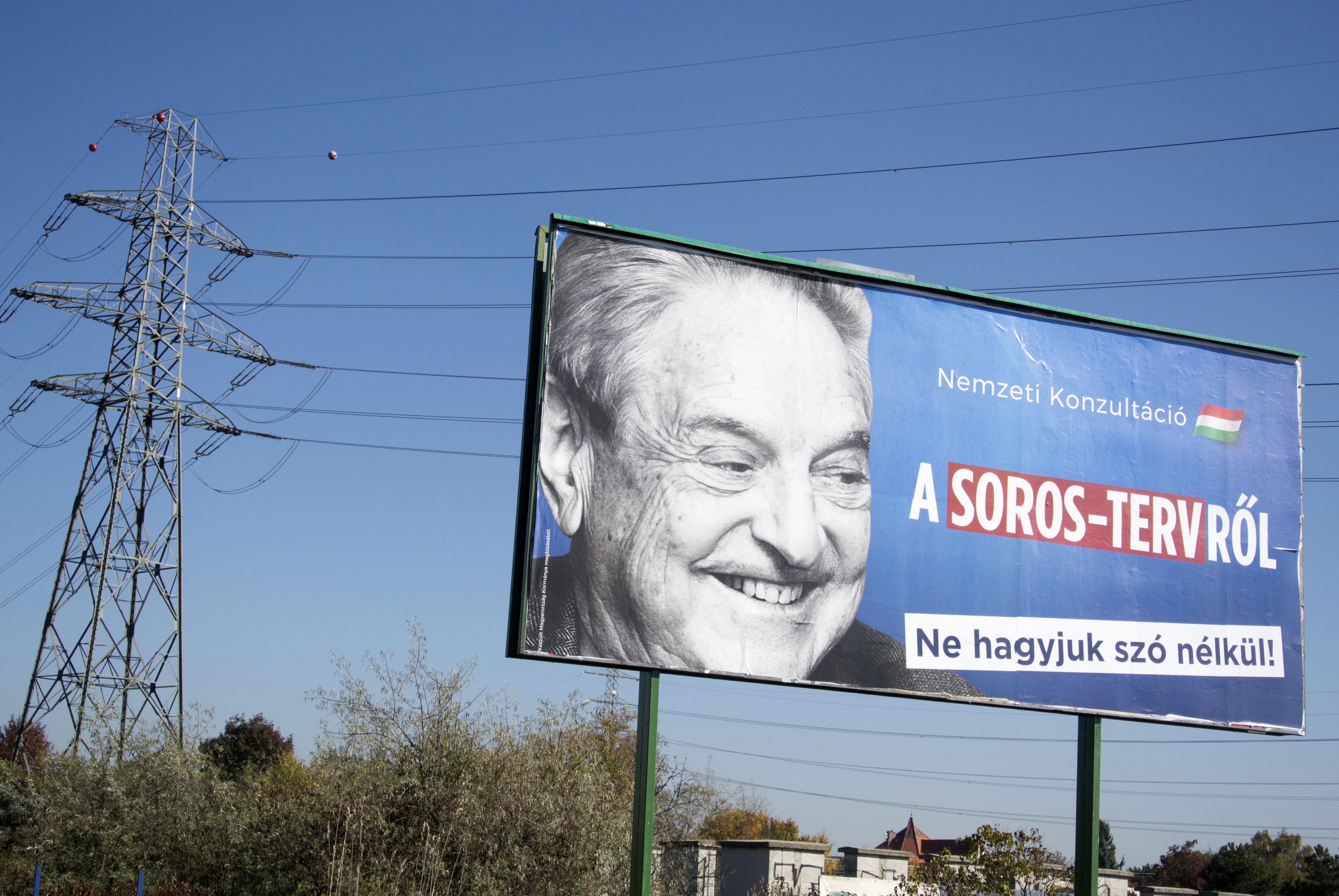
A billboard shows Hungarian-American billionaire and philanthropist George Soros. A central element of the election campaign is the multi-media campaign launched against him and a so-called “Soros Plan”, which is allegedly supporting mass immigration into the EU. Photo: © Attila Kisbenedek / AFP / picturedesk.com
One can tell many stories about Viktor Orbán. There’s the one about the country boy who grew up poor and didn’t use a modern bathroom with hot water until he was 15 years old. His father was an engineer and member of the Communist party; his mother was a teacher. The young Viktor was a passionate football player who trained four times a week. He never became a professional player, but he did become the youngest prime minister in Hungary’s history. This first story is a tale of upward mobility.
Then there is the story of how Orbán became politicised. It starts during his time in the military and continues in a student halls of residence in Budapest – which is where, along with some fellow students, the then law student Orbán founded his party. He wasn’t following any particular ideology – just the desire to be in power. The one thing that has stayed with him throughout the years is his hatred of liberal academics, like the kind who are said to have scornfully straightened the “country bumpkin’s” tie, when he entered parliament in 1990.“Orbán loves confrontation. It’s his lifeblood,” says a member of the European Parliament, who knows him from joint meetings. This second story is a tale of Viktor Orbán, the troublemaker.
The one thing that has stayed with him [Orbán] throughout the years is his hatred of liberal academics, like the kind who are said to have scornfully straightened the “country bumpkin’s” tie, when he entered parliament in 1990
A third story has to do with the spaghetti western, Once Upon a Time in the West. Orbán claims to have seen the film 15 times. He explained why in an interview, saying that the heroes can’t win just by shooting and throwing punches. They also have to use their brains to skilfully attack their rivals. Orbán might make radical decisions, but he always finds legal clauses that legitimise them. His team is media-savvy and fluent in English. Anyone who wants to read the 30 March law will receive it within a few days and in multiple languages. Another example is the justice minister Judit Varga. An MEP describes her as a “smart, rhetorically talented politician” who defends Orbán’s policies and engages in discourse.
The Strategist
Story Number Three is the tale of Viktor Orbán, the strategist. In 2015, he became an overt antagonist to German chancellor Angela Merkel and her “we can do this” policy. He warned that millions of foreigners from the Middle East and Africa would come over and inundate little Hungary. Orbán, once a liberal atheist, was suddenly presenting himself as the saviour of the Christian West. “Orban was the first to recognise how easy it was to instrumentalise the topic of migration and how he could use refugees as leverage for his own political goals,” says Andreas Schieder, an MEP from Austria’s social democratic SPÖ party.
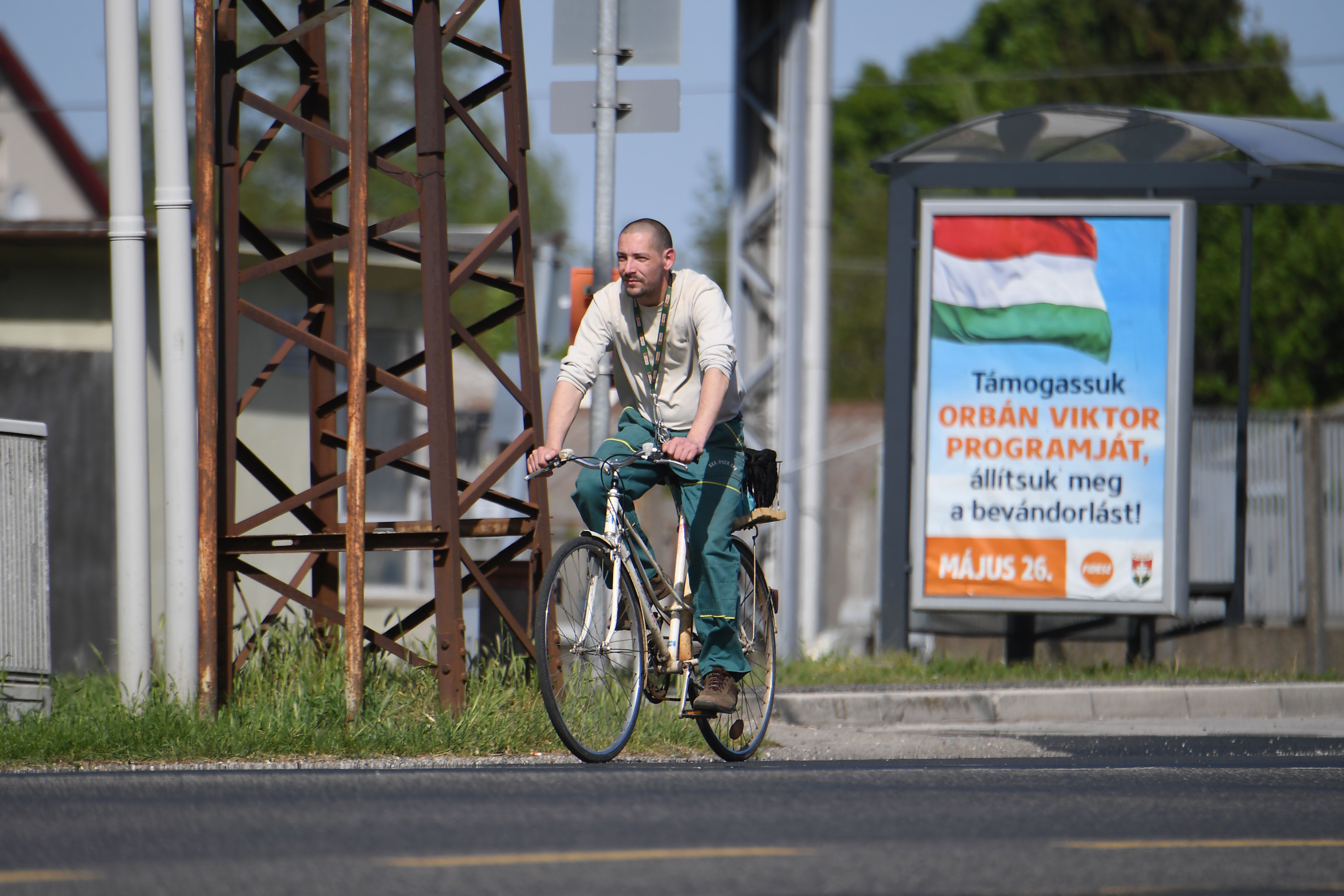
A Fidesz election campaign poster for the 2019 European Parliament elections in the Hungarian city of Csorna, one of Viktor Orbán’s traditionally supportive areas: “Support Viktor Orbán’s program, stop immigration!” In the last two parliamentary elections, Orbán’s ruling Fidesz achieved its greatest national success in the city with 10,000 inhabitants. Photo: © Attila Kisbenedek / AFP / picturedesk.com
Ska Keller, co-president of the Greens/EFA group in the European Parliament, says: “It doesn’t matter what the crisis is – migration, coronavirus – Orbán capitalises on it politically.” Indeed, Orbán has long since stopped railing exclusively against refugees, and today also targets critical voices from civil society. Following his re-election in 2018, the pro-government weekly Figyelö published a list of “enemies of Hungary”. The list included several academics who lecture at the Soros-founded CEU, all the editors working for an investigative website, and the staff of Amnesty International’s Hungarian office. The same year, Orbán banned the CEU’s master’s course in gender studies. The government justified the move by saying that there was no need for those types of graduates in Hungary.
In 2018, Orbán banned the CEU’s master’s course in gender studies. The government justified the move by saying that there was no need for those types of graduates in Hungary.
Even for fellow conservative politicians, that was a step too far. “Orbán is an angry old white man,” says an MEP for Austria’s conservative ÖVP. At Easter, the European People’s Party (EPP) was facing a long-standing dilemma: how to deal with those seeking to destroy democracy? In March 2019, Fidesz’s membership of the EPP was paused indefinitely – a kind of suspended sentence. Will the 30 March law be enough to get the party expelled for good?
Orbán has deeply divided Europe’s Christian Democrats. “Things have been close to boiling over in the party for a while now,” says Ska Keller of the Greens. The SPÖ’s Schieder talks of three camps: There’s the “Enough!” camp, which is calling for the immediate expulsion of Fidesz and includes MEPs from the Netherlands, for example. Then there’s the “Dialogue” camp that wants to tame Orbán and is warning that expelling him could, as happened with the British Tories in 2009, lead to Hungary leaving the EU. The third camp, says Schieder, is blindly defending Orbán. “It includes politicians such as Wolfgang Schüssel and Sebastian Kurz.”
Erhard Busek, ex-vice chancellor of Austria and member of the ÖVP, is in the second camp. He has always sought dialogue with Orbán, an approach motivated by personal reasons. “I helped him found his party,” says Busek on the telephone. When Orbán stood for his first election in 1990, the ÖVP sent poster boards to Budapest. Back then, says Busek, Orbán was a “likeable and open-minded discussion partner”. Today, Busek admits that Hungary has become “more or less a family business” and that the freedom of the press is under pressure. He believes this is partly down to his own party: “We should have gone there more,” he says.
Ask observers to describe the EPP’s approach to Hungary, and you’ll hear things like “they’re dithering,” “it’s a complete fiasco” and “it’s all just a sham”. And one name comes up all the time: Ursula von der Leyen. It’s said that she is indebted to Orbán because she was elected president of the European Commission thanks to votes from Fidesz MEPs. The day after the vote in Budapest, von der Leyen said in a statement that democracy must not be trampled underfoot during the coronavirus pandemic. Yet she avoided actually naming Hungary itself. Claudia Gamon of Neos commented on this by saying: “If Orbán wasn’t a European, we would criticise him much more openly, as we do Erdogan in Turkey or Putin in Russia. We Europeans don’t want to believe that we’re capable of evil.”
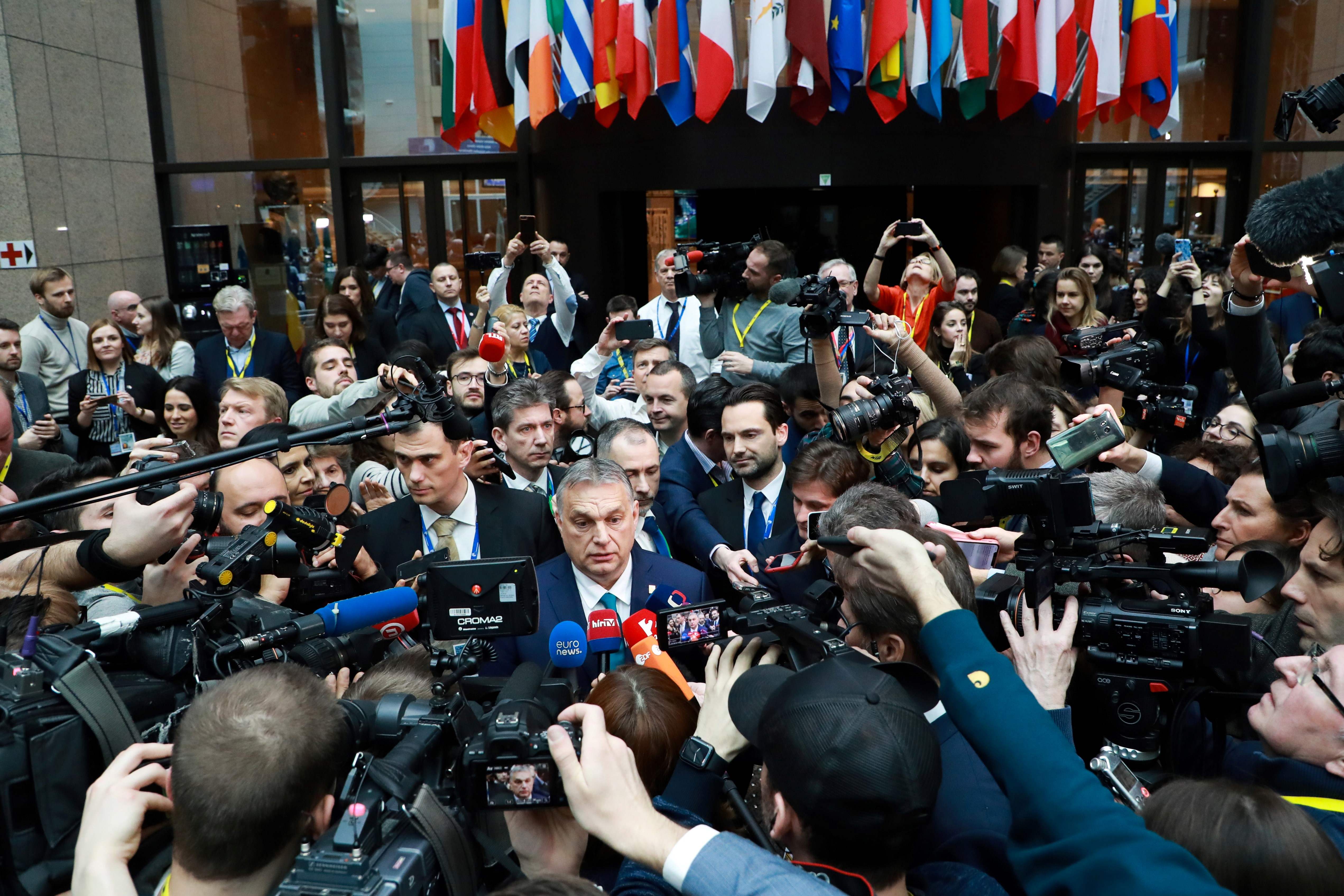
Viktor Orbán draws a disproportionately large amount of money from Brussels and is also one of the loudest EU critics. He polarizes, exposes well-known weaknesses of the EU. He leaves his critics at a loss with how to deal with populists in the member states or with the European Council’s power, the body of heads of state, and government that is often put on the brakes when making decisions. Orbán, in February 2020, during a Council meeting on the EU budget. Photo: © Ludovic Marin / AFP / picturedesk.com
Orbán lays bare well-known weaknesses of the EU: its inability to work out how to deal with populists in its member states, for instance, or the power of the European Council (comprised of the heads of states and government), which often applies the breaks when it comes to making decisions. In September 2018, the European Parliament called on the Council to trigger an Article 7 procedure – i.e. infringement proceedings – against Hungary. The MEPs’ concerns included the independence of the judiciary, freedom of expression and the situation regarding migrants and refugees. The process is still in a holding pattern today, and even MEPs in the EPP say that they “didn’t vote in favour of the motion only for it to come to nothing.”
In a report published in mid-April, the think tank ESI calculated that Hungary has been granted €25 billion in EU funds over the last six years. This was supplemented by €5.6 billion from the EU’s Coronavirus Response Investment Initiative on 30 March. Italy, meanwhile, a country with six times as many inhabitants, got just half that amount. Orbán is taking disproportionately large amounts of money from Brussels, but is also one of the loudest critics of the EU. Claudia Gamon says that this is just as contradictory as his “illiberal democracy”.
In a report published in mid-April, the think tank ESI calculated that Hungary has been granted €25 billion in EU funds over the last six years. This was supplemented by €5.6 billion from the EU’s Coronavirus Response Investment Initiative on 30 March.
“It’s nothing more than propaganda,“ she says, “because illiberal policies cannot exist in a democracy.” But in fact, they do. And not only in Hungary. Orbán is the best example of how Francis Fukuyama was wrong in his essay on “the end of history”. Fukuyama, a political scientist, predicted that, following the collapse of the Soviet Union, liberal democracy would win out as the dominant model of government. But history isn’t a motorway where everything keeps rapidly moving forward. Orbán is showing that history can also go backwards.
Back to the Future
There is a last, fourth story that can be told about Orbán. It’s the story of an idealist and a bearer of hope. It begins on 16 June 1989, the day that communism was buried in Hungary – and with it, Imre Nagy, the leader of the anti-Soviet uprising of 1956. For 30 years, the body of this “counterrevolutionary” reviled in Moscow lay in a mass grave. Then, in 1989, Nagy was to be solemnly transferred to another grave. It was the beginning of the end of Kádár’s communist dictatorship.
On that day, Lendvai also watched as a young man, barely 26 years old, stepped up to the microphone. His white shirt was unbuttoned, he had a beard and his hair was dishevelled. In his speech, Viktor Orbán called for free elections and for a withdrawal of Soviet troops. His words made him famous throughout Hungary overnight. In retrospect, this was a paradoxical moment: The man calling for more democracy would later abolish it.
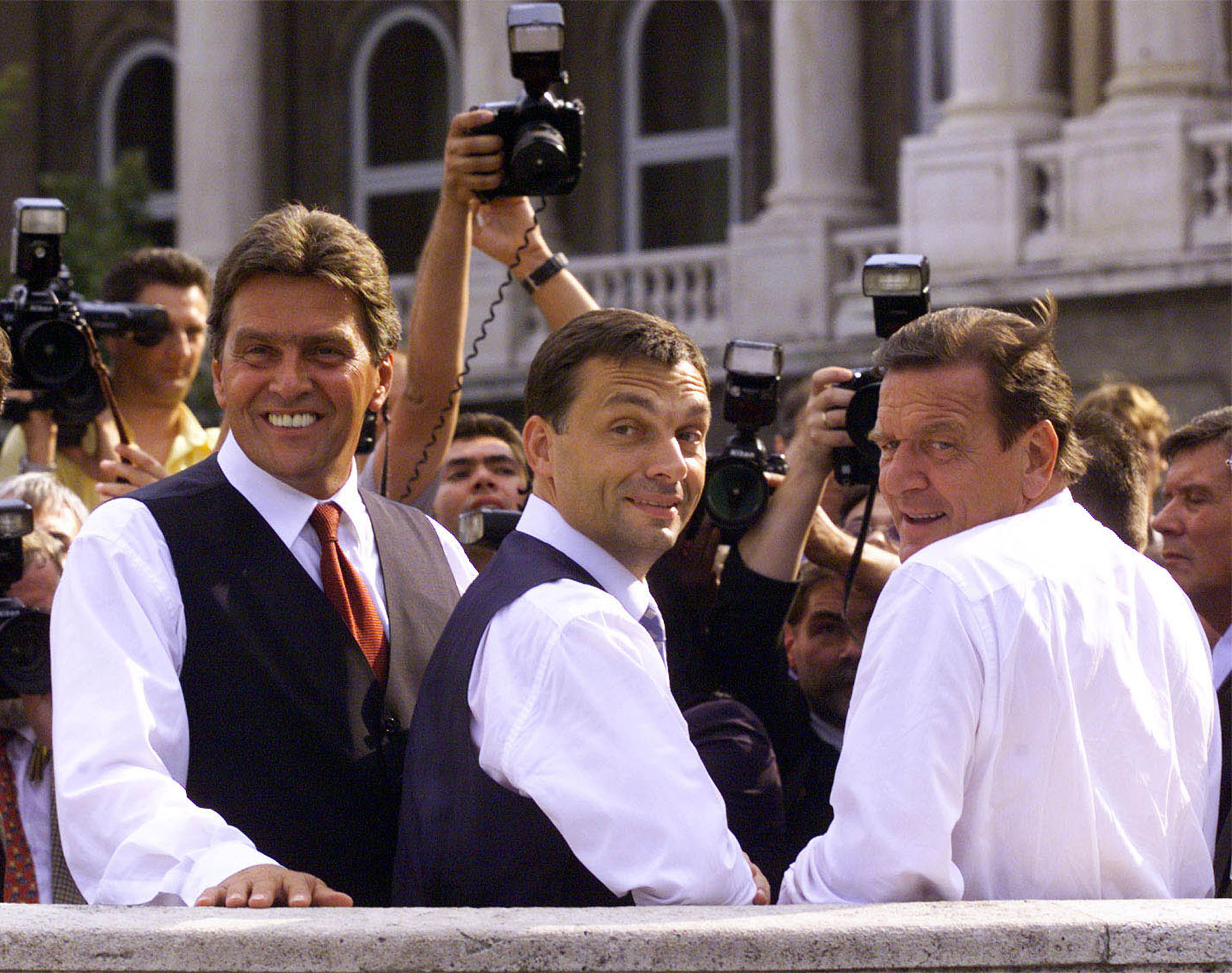
On 10 September 1999, the 10th anniversary of the historic opening of the border for East German refugees to Austria, the then Austrian Chancellor Viktor Klima (SPÖ), the Hungarian Prime Minister Viktor Orbán and the German Chancellor Gerhard Schröder (SPD) were solemn with the media in Budapest. A year earlier, Orbán became the youngest prime minister in Hungarian history. After leading the opposition between 2002 and 2010, he was able to win a parliamentary majority again in 2010. Since then, the former liberal has been radically rebuilding the state in his favor. Photo: © Noemi Bruzak / AP / picturedesk.com
Today, Lendvai is 90 years old. On the evening of 13 April, he picks up the telephone to talk about how Hungary has changed since Orbán’s speech in 1989.“When I was writing my first books about Hungary all those years ago,” he begins, “I could never have imagined the things that would happen there.” Lendvai calls the system that Orbán has put in place a sham democracy, in which parliament and the courts exist, but only as decoration. At the same time, though, he has to admit that the system does grant certain freedoms. As yet, no foreign journalists have been expelled. Lendvai, one of Orbán’s fiercest critics, can travel to Budapest without worrying about his safety.
To maintain the appearance of a democracy, Orbán continues to allow critical journalists. He stands for election and sometimes loses. Since 2019, Budapest and seven other cities, including Szeged and Pécs, have been ruled by the opposition. Orbán can use these small successes of his critics whenever anyone accuses him of playing the Danube Dictator. “Orbán is one of the shrewdest politicians in modern history,” says Lendvai. He admits that he underestimated “the whole lot of them”.
(Re-)construction team
By “them”, Lendvai is referring to Fidesz, the party founded in 1988 in Bibó István, a student halls of residence in Budapest. Orbán and his fellow students were young and liberal; Western Europe was their role model. The patron George Soros gave the young politicians a printer and half a million euros every year as start-up capital. When the socialists came to power in 1994, Orbán radically changed the path of his party. “His strategy was to prevent anyone from being further right than him,” says the ÖVP’s Erhard Busek. Prior to this, Fidesz MPs had disparagingly referred to the Christian Democrats in parliament as “bible bashers” and criticised their antisemitic undertones.
Now, suddenly, the party was talking about patriotism and playing on national emotions. The transformation worked: In 1998, the then 35-year-old Orbán became Hungary’s youngest prime minister, serving for four years. His real breakthrough, though, came in the 2010 parliamentary elections. Orbán ran his campaign partly under the banner of the “Trianon trauma”. In 1920, following the collapse of the Habsburg empire, Hungary lost three quarters of its territory to neighbouring countries. The Catholic middle classes in rural areas of Hungary were particularly upset by the loss of their fellow citizens. Orbán didn’t want to lose these voters to the extreme right-wing Jobbik movement.
After Fidesz’s resounding election success – the party won 53 percent of the vote – Orbán delivered on his national promise. For ethnic Hungarians living abroad, he gave them voting rights and passports. This was a clever tactical move, since most of this group voted for Fidesz.
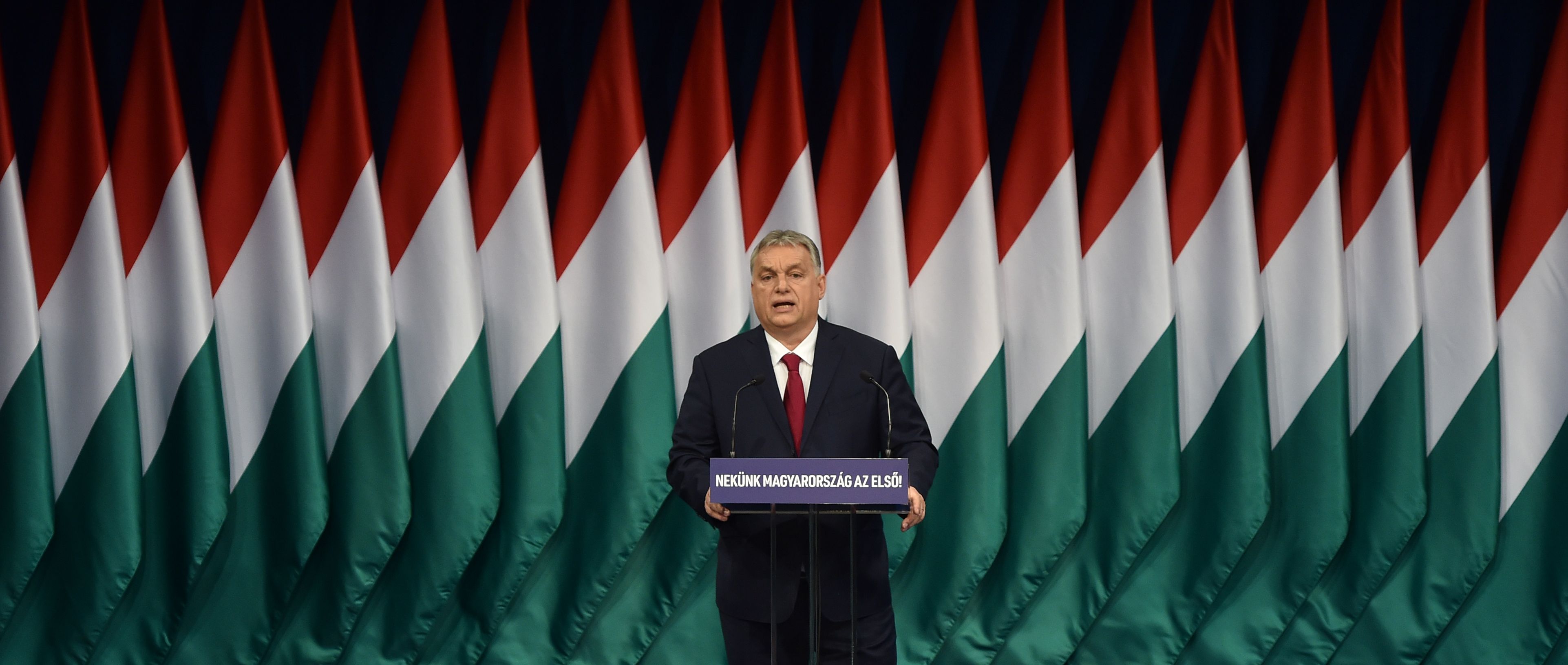
Viktor Orbán at his annual State of the Union address in Budapest on February 16, 2020. He speaks of the love of the home country and relies on national emotions. For Viktor Orbán, Corona is less of a springboard than a new stage to celebrate his power. “For Orbán, politics is like football,” wrote journalist Paul Lendvai once. The prime minister managed to be everything at the same time – goalkeeper, striker, referee. Photo: © Attila Kisbenedek / AFP / picturedesk.com
At the same time Orbán began remodelling the state, passing a new constitution in 2011. This removed the opposition’s ability to nominate candidates for the Constitutional Court and instead placed it in the hands of parliament, where Fidesz has a two-thirds majority. The independent president of the Supreme Court, András Baka, was replaced by a pro-Fidesz judge; András Simor, governor of Hungary’s central bank, was replaced by a former Fidesz finance minister. Orbán handed out strategically important jobs to his old friends.
János Áder, a founder of Fidesz, has been president of Hungary since 2012. József Szájer, a long-time companion of Orbán’s, is an MEP in Brussels. Szájer is said to have written the new constitution on his iPad, during a train journey between Strasburg and Budapest. In the process, he invented a new central authority called the National Office of the Judiciary. Its role includes appointing judges. The position of president of the new office went to Tünde Handó, Szájer’s wife. This questionable HR decision is just one of many ways in which Orbán has subjugated the judiciary. Lawyer Herbert Küpper says that the Constitutional Court has not ruled against the government on any politically or symbolically important matters for more than five years.
For Orbán, the coronavirus pandemic is less of a springboard than a new stage on which he can celebrate his power. The journalist Paul Lendvai once wrote that, for Orbán, politics is like football. The prime minister has succeeded in being everything at once – goalie, striker, referee. The tabloids reward him by shining the floodlights on him, while the opposition has long been relegated to the spectators’ stands. When Orbán says that he needs “133 brave people”, it sounds more like he is talking to himself than to them. He alone decides how this game will be played.
So are Hungary’s media all that’s left? Viktória Serdült of the weekly magazine HVG has read the fake-news law very closely. She says that she now checks her articles even more thoroughly. With every sentence, she asks herself: Might this land me in jail? Orbán doesn’t have to turn the heat right up immediately – allow it to keep rising slowly and imperceptibly will be just fine.
Original in German. Published in May 2020 in DATUM.
Translation into English by Jen Metcalf.
This text is protected by copyright: © DATUM / Franziska Tschinderle. If you are interested in republication, please contact the editorial team.
Copyright information on pictures are noted directly at the illustrations. Cover picture: Viktor Orbán at his annual State of the Union with party members and sympathizers in Budapest, on 16 February 2020. Photo: © Attila Kisbenedek / AFP / picturedesk.com